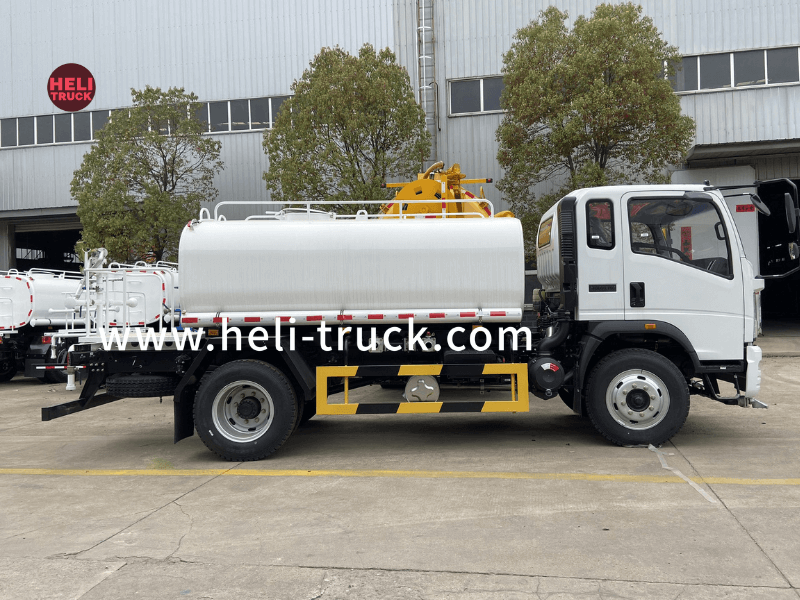Introduction
Garbage compactor trucks play a crucial role in waste management systems, efficiently collecting and compacting waste to reduce its volume. In recent years, advancements in technology and design have led to the development of high-performance garbage compactor trucks that offer increased efficiency and productivity. This article will explore the features and benefits of these cutting-edge vehicles, highlighting their impact on waste management operations.
Evolution of Garbage Compactor Trucks
Garbage compactor trucks, also known as waste collection vehicles or refuse trucks, have been an integral part of urban sanitation systems for decades. Initially, these trucks were simple in design, consisting of a hopper for collecting waste and a compactor mechanism to compress the waste before disposal. Over time, advancements in engineering and technology have transformed these vehicles into highly sophisticated machines capable of handling large volumes of waste with maximum efficiency.
Types of Garbage Compactor Trucks
There are several types of garbage compactor trucks available in the market, each designed to meet specific operational requirements. The most common types include:
1. Rear work truck for sale : These trucks feature a compactor mechanism at the rear, allowing waste collectors to load trash from bins into the hopper for compaction. Rear loader compactor trucks are ideal for residential areas and narrow streets where maneuverability is essential.
2. Front Loader Compactor Trucks: Front loader compactor trucks are equipped with a front-loading mechanism that can lift and empty large dumpsters into the hopper for compaction. These trucks are commonly used for commercial and industrial waste collection.
3. Side Loader Compactor Trucks: Side loader compactor trucks are designed with a loading mechanism on the side of the vehicle, enabling waste collectors to pick up trash from curbside bins. These trucks are well-suited for areas with limited space and tight parking restrictions.
4. Automated Compactor Trucks: Automated compactor trucks feature robotic arms or grabbers that can autonomously pick up and empty waste bins into the hopper for compaction. These trucks are highly efficient and reduce the manual labor required for waste collection.
Features of High-Performance Garbage Compactor Trucks
High-performance garbage compactor trucks are equipped with advanced features and technologies that enhance their efficiency, durability, and overall performance. Some of the key features of these cutting-edge vehicles include:

1. Powerful Compaction System: High-performance compactor trucks are equipped with powerful hydraulic systems that generate high compaction forces to compress waste effectively. This results in increased payload capacity and reduced frequency of trips to disposal sites.
2. Large Capacity Hopper: These trucks feature spacious hoppers that can accommodate large volumes of waste, allowing for more efficient collection and compaction processes. A larger hopper reduces the need for frequent unloading, improving overall productivity.
3. Enhanced Maneuverability: High-performance compactor trucks are designed for optimal maneuverability, with features such as tight turning radius, adjustable steering systems, and advanced suspension for smooth operation on various terrains.
4. Integrated Safety Features: Safety is a top priority in waste management operations, and high-performance compactor trucks are equipped with advanced safety features such as rearview cameras, proximity sensors, and automatic braking systems to prevent accidents and ensure the well-being of operators and pedestrians.
5. Eco-Friendly Technology: Many high-performance compactor trucks are equipped with eco-friendly technologies such as low-emission engines, hybrid powertrains, and regenerative braking systems to reduce fuel consumption and minimize environmental impact.
Benefits of High-Performance Garbage Compactor Trucks
The adoption of high-performance garbage compactor trucks offers numerous benefits to waste management companies, municipalities, and communities. Some of the key advantages of these advanced vehicles include:
1. Increased Efficiency: High-performance compactor trucks are designed to maximize efficiency in waste collection and compaction processes, leading to faster turnaround times, reduced operating costs, and improved overall productivity.
2. Cost Savings: By optimizing waste collection and compaction operations, high-performance compactor trucks help reduce fuel consumption, maintenance costs, and labor expenses, resulting in significant cost savings for waste management organizations.
3. Improved Waste Handling: The powerful compaction systems and large hopper capacities of high-performance compactor trucks enable efficient handling of various types of waste, including bulky items and recyclable materials. This ensures thorough waste collection and compaction, minimizing the risk of littering and overflow.
4. Enhanced Safety: The integration of advanced safety features in high-performance compactor trucks enhances the safety of waste collection operations, reducing the risk of accidents, injuries, and property damage. This promotes a safer working environment for operators and pedestrians.
5. Environmental Sustainability: High-performance compactor trucks with eco-friendly technologies contribute to environmental sustainability by reducing greenhouse gas emissions, conserving natural resources, and promoting recycling and waste diversion efforts. These vehicles play a vital role in achieving sustainable waste management practices.
Case Studies and Success Stories
Several waste management companies and municipalities have successfully implemented high-performance garbage compactor trucks in their operations, achieving notable improvements in efficiency, productivity, and environmental impact. One such case study is the City of Greenfield, which upgraded its fleet of waste collection vehicles to high-performance compactor trucks equipped with state-of-the-art compaction systems and safety features. As a result, the city experienced a 30% reduction in fuel consumption, a 20% increase in waste collection capacity, and a significant decrease in vehicle maintenance costs.
Another success story is Waste Management Inc., a leading waste services provider that deployed a fleet of automated compactor trucks in urban areas with high population density. These advanced vehicles improved waste collection efficiency by 40%, reduced labor costs by 25%, and increased recycling rates by 15% through the automated sorting of recyclable materials.
Conclusion
High-performance garbage compactor trucks represent the future of waste management, offering unparalleled efficiency, productivity, and sustainability benefits. By incorporating advanced features such as powerful compaction systems, large hopper capacities, and eco-friendly technologies, these cutting-edge vehicles are revolutionizing waste collection and compaction operations worldwide. Waste management companies, municipalities, and communities that invest in high-performance compactor trucks stand to gain significant cost savings, operational efficiencies, and environmental advantages, making them an essential component of modern waste management systems.
